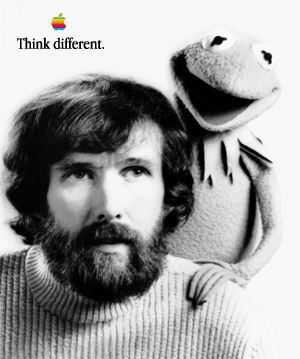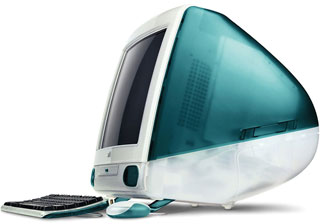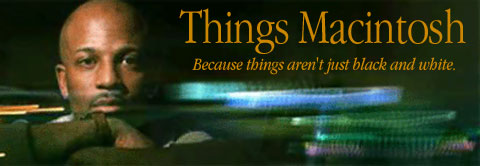Certainly Bill Gates doesn’t like to be characterized as a megalomaniac, and Steve Jobs doesn’t like to be described as a sociopath, but that’s what they are. Trust me. – Robert X. Cringely, Accidental Empires: How the Boys of Silicon Valley Make Their Millions, Battle Foreign Competition, and Still Can’t Get a Date
I am young and strong, and do not get tired; but for my mother, this journey has been a very trying one. – Fyodor Dostoevsky, Crime and Punishment
The Mac web has been abuzz for the last two weeks about Steve Jobs’ keynote address that kicked off Macworld Expo 2000 in San Francisco.
The iMan’s statements have been deconstructed and reconstructed beyond excess. What interested me, however, was not his keynote, but an interview that he granted to CNN several hours later. It wasn’t the things he said that interested me; it was the things that were never said. I was impressed with the excitement that shone in his eyes as he talked.
Am I biased, or do I normally sense condescension in Bill Gates’ public demeanor?
Having never had time to pay much attention to Mr. Jobs’ spotlight in the media, I sat in my hotel room that night and watched his interview with keen interest as I took advantage of my rare glimpse into the personality and character of His iNess.
On the other hand, I have seen several interviews with Bill Gates, which is what led me to the thoughts I want to express here.
I’ve often wondered why Steve Jobs isn’t as “successful” as Bill Gates. One of the obvious reasons is that the two men founded companies residing in divergent markets (hardware vs. software); granted, we could argue further that Apple limited its potential success from the word go by setting itself up as the underdog alternative to the “mainstream” computing platforms. As a result, the two corporate giants attract customers from diametrically different pools of humanity.
I kept coming up with additional explanations, but began to realize that they all overlap, to the point that no single explanation can sufficiently describe the twin success stories, nor could they explain the computing world’s love-hate relationship with Mr. Gates. Meanwhile, Mr. Jobs’ influence is perennially overlooked in the scheme of things.
Regardless of their companies’ health (who am I kidding here?), there is a fascination with these two men. Either by accident or by design (or by years of good PR), they personify their respective companies, so I’d juxtapose these two gentlemen and attempt to divine the secret of their charisma – their mojo, if you will.
But first, let’s look at the ways in which they are similar. It’s probably more ways than they’d care to admit.
Yin, Yang, and Other Deconstructed Thangs….
Sin boldly! – Martin Luther, Theologian and Christian pseudo-iconoclast
 When you strip away the smoke and mirrors that Apple, Inc., has masterfully constructed into warm, fuzzy Think Different ad campaigns, you get a computer company that is not that really different than Microsoft in many ways.
When you strip away the smoke and mirrors that Apple, Inc., has masterfully constructed into warm, fuzzy Think Different ad campaigns, you get a computer company that is not that really different than Microsoft in many ways.
Sure, it’s a company that makes some really kewl computers and a really slick operating system, but it’s a company nevertheless.
Warm fuzzies don’t keep at bay a dog-eat-dog reality of the industry: You’re only as good as your latest product demo.
Hence, I’m guessing that Steve Jobs can be as Machiavellian as Bill Gates is purported to be. I have no disillusions here. Computer business is war, and in war, good and evil are often blurred in the name of the bottom line. I’m sure that organizational chess has killed an Apple competitor or three along the way, so Mr. Jobs probably isn’t too quick to cluck his tongue when Microsoft gets nicked for some corporate transgression.
Even so, there is one redeeming trait that Steve Jobs has over Bill Gates: Steve Jobs is a loser.
Losers Eventually Win Some
There is a singular truth about people who win all of the time: The longer it is before they have that first loss, the more profound the loss’ affect will be on them.
In many ways, Steve Jobs suffered major loses at a relatively early time in his career. Loss #1: Mr. Jobs was ousted from Apple in 1985. Loss #2: The NeXT computer wasn’t the smashing success that it should have been. (Jobs launched NeXT in 1986 and sold it to Apple in 1996.)
Imagine being at the top of the world and then being relegated to ignominy virtually overnight. What a blow to the ego. Then again, Mr. Jobs may have an ego the size of Texas, and he may not humiliate as easily as us mere mortals.
But I imagine that those years in the “wilderness” affected him in some ways.
Did he get introspective? Did he reprioritize what’s really important? Is his current leadership at Apple the end result of his time out of the spotlight?
Possibly.
Regardless, his being a “loser” may have been the shot in the arm he needed to become the consummate leader he is today. Furthermore, the possibility of being labeled a loser is the price to pay for being a visionary. Visionaries aren’t afraid to risk their fame to push the envelope.
By this same definition, Bill Gates is not visionary.
 Every business venture he took on behalf of Microsoft has been for the sole purpose of expanding the company’s scope and influence on the market. Nearly every move made has been consistently a bet on a “sure thing” – not counting Bob, which was Microsoft’s Copland.
Every business venture he took on behalf of Microsoft has been for the sole purpose of expanding the company’s scope and influence on the market. Nearly every move made has been consistently a bet on a “sure thing” – not counting Bob, which was Microsoft’s Copland.
Sure, the initial deals that gave the world DOS and Windows can be deemed gutsy, but I would not call them visionary by a long shot. They were gambles, but they were gambles of the Las Vegas casino variety. The goal of those deals was to make money.
Those were merely calculated business ventures.
You see, Bill Gates isn’t a loser. He was born into a family of means. I doubt if he ever suffered failure from a business decision. He only picks fights that he knows he can win. He strikes me as the type that will rarely go with gut instincts – especially if there is risk of losing it all. Pride and greed is stronger than a desire to make the world a better place. (As if Steve Jobs hasn’t either of those twin monkeys on his back.)
Apple and Steve Jobs, however, often made moves that carried significant risk. But it seems that Apple’s actions were for the purpose of introducing to the world empowering technologies that were heretofore unreleased (I’m not naïve; Apple also has organizationally selfish motives – after all, “the end of every business is monopoly,” as one wise person once said).
The iCEO and the iCompany currently share a visionary zeal that shadows the company’s latest technological thrust. To what else could we attribute the iMac and its resultant industry reverberations?
A cautionary note must be made, though.
Ever since DOS and Windows assimilated the marketplace, Microsoft has become dull and predictable. That is a possible future that Apple can lull itself into, if visionary leadership isn’t maintained. That is the path of least resistance that Apple will always have to resist actively.
This Explains OS X and More
This is one reason why I can gladly “put up with” Mac OS X, even though I have seen only the demo at Macworld. I’m looking at it as a vision, not as a product. Vision carries risk. There is risk associated with being forward thinking. This may be what many nay sayers in the Mac community are overlooking.
Apple is willing to take a risk to push the industry forward. As Mac users, we may come kicking and screaming, but eventually, what we resist is seen as obviously the right thing to do – often, in hindsight.
 I didn’t like the iMac when it first shipped. I love it now. Ditto for Mac OS 9. I didn’t allow them to grow on me; I had to shift my paradigm and accept the fact that the Mac OS is antiquated, and that the appliance-like quality of the iMac is the future. Can’t you see it?
I didn’t like the iMac when it first shipped. I love it now. Ditto for Mac OS 9. I didn’t allow them to grow on me; I had to shift my paradigm and accept the fact that the Mac OS is antiquated, and that the appliance-like quality of the iMac is the future. Can’t you see it?
Here’s to the crazy ones – the ones who think they can change the world are often those who do.
Sure, the company isn’t perfect. Sure, Apple may not always get it right the first time.
But you’ve gotta admit, it’s exciting to watch them try.
Publisher’s note: From the perspective of almost 15 years later, things have changed drastically. Microsoft has had significant failures since 2002: Windows Me was a stopgap fix of Windows 95, Windows Vista gave Microsoft its biggest black eye yet, Windows 8 is on the way out two years after its release, Microsoft’s oft-renamed smart phone OS (currently known as Windows Phone) has never taken off, Surface and Surface Pro sales have embarrassed Microsoft even when they are being sold for below cost, and since Microsoft has taken over Nokia’s mobile phone division, it has taken a nose dive as well.
On the other side, Steve Jobs introduced iTunes, Mac OS X, the iPod, the iPhone, and the iPad, all to great success. He oversaw the Mac’s migration from PowerPC processors to Intel Core CPUs, which put them on the same chips as the PC industry and ended the Megahertz Wars of old. Jobs also killed off unprofitable Apple divisions after taking charge of the company, most notably the Newton and printer divisions, putting a strong focus on the Mac and, later on, consumer electronics products, all leading to Apple becoming one of the most valuable brands and companies in the world.
Smart losers learn from their mistakes, and Steve Jobs did it in spades. Dan Knight, publisher, Low End Mac
Keywords: #stevejobs #billgates
Short link: http://goo.gl/AFSXgr
searchword: jobsvsgates


